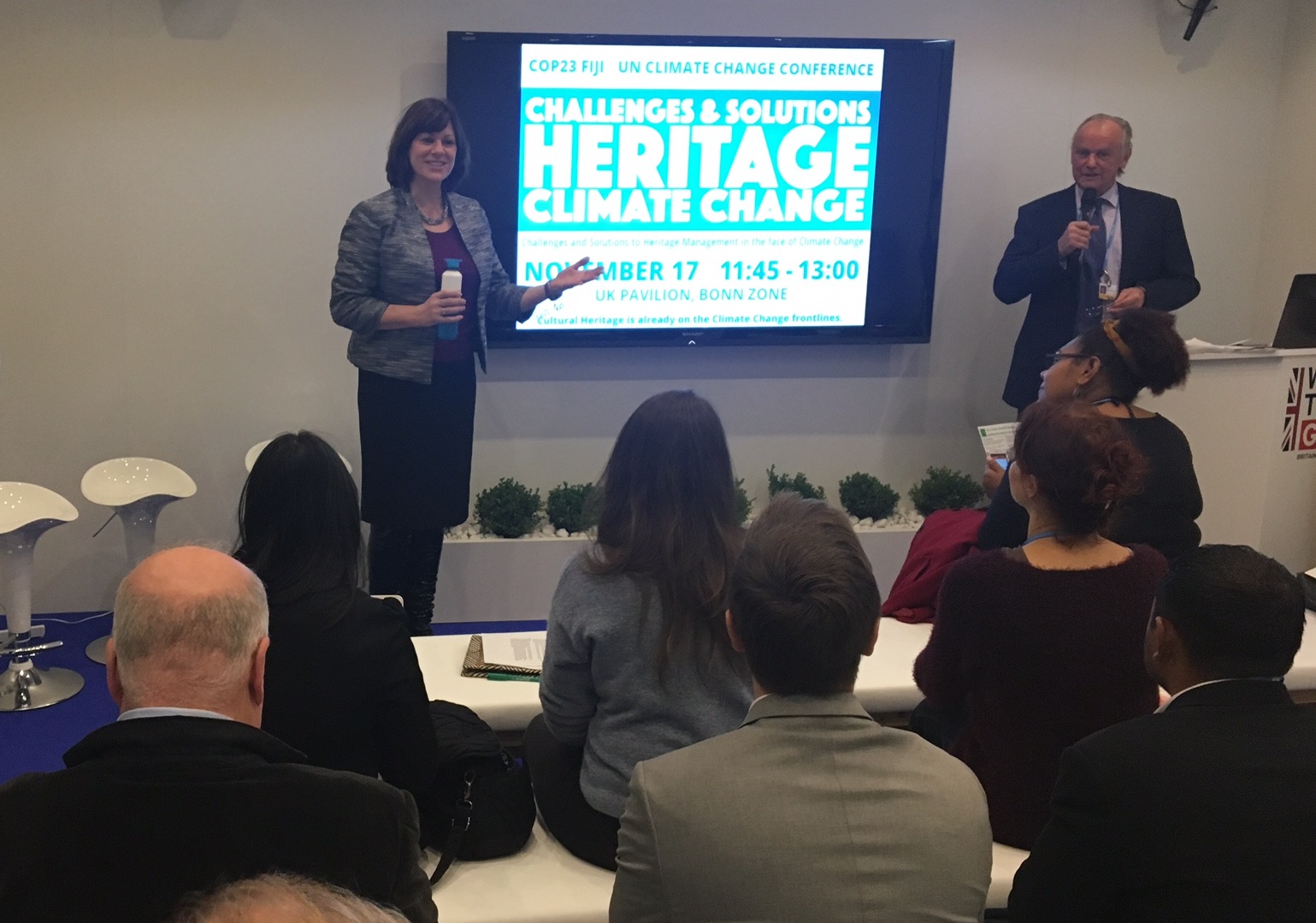-
UN Climate Talks: We really are all in the same canoe
Posted on November 17, 2017
“We’re all in the same Canoe”
With these words, the Prime Minister of Fiji opened proceedings at the UN climate change talks in Bonn last week.
Hosting a COP (Conference of the Parties to the United Nations Framework Convention on Climate Change) is an expensive and complicated business, so while the Pacific Island of Fiji holds the summit’s rotating presidency, the 23rd edition is being held in Bonn.
Once again a small team from the International National Trusts Organisation (INTO) is using the COP as a stage to promote the excellent work of its member organisations in climate change mitigation, adaptation and education: the production of heating bricks made from mowed heath by the Gelderland Trust and sold in their shops; the protection of the Sigatoka Sand Dunes by the National Trust of Fiji to provide an effective barrier between the ocean and local communities in the face of predicted rising sea levels and extreme weather events or the education programmes of the National Trust of the Cayman Islands.
Challenges and Solutions Event, 17 November 2017
Today (Friday 17 November) INTO held its final side event, at the UK Pavilion, where we were joined by Minister of State for Climate Change and Industry, Claire Perry MP.

UK Minister Claire Perry MP and Oliver Maurice at our side event on Friday 17 November 2017
The Minister spoke about the Powering Past Coal Alliance developed by the UK and Canada and aimed at driving a global coal phase-out. (None in the UK by 2025 and none in Canada by 2030.) She also urged faster action to cut emissions – there are only two countries doing enough to reach the 2 degree target, namely Britain and China. She was thrilled to learn more about the work of INTO and its member organisation in the climate change field. The British government is working to restore traditional cultural practices but need networks on the ground – an opening for INTO, perhaps?
Two years after the Paris Agreement was signed at COP21, the main challenge in Bonn is to agree how to implement the commitments, which will be finalised and approved at COP24 in Poland next year.
Former NT Regional Director, INTO volunteer and COP aficionado, Oliver Maurice has been joined by Keith Jones, Environmental Practices Adviser at the National Trust in Wales, and Andrew Potts of US/ICOMOS. You can read Oliver’s blogs here and Keith’s here.
“We’ll always have Paris … “
Although on Wednesday, Chancellor Angela Merkel disappointed hopes for a strong statement on Germany’s climate goals and the future role of coal, Oliver has been struck by the progress being made in America: “It is clear that many of the American states are continuing to pursue a non-fossil fuel approach despite their leader pulling out of the Paris Agreement, and that would seem to be borne out judging by the numbers of Americans that are here. And they are doing well. The US is already at least halfway to meeting its 2025 Paris pledge. The majority of their emission reductions have come from the electric sector, where the country has been retiring coal-fired power plants and replacing them with clean energy.”

The Fijian hosts have taken the opportunity to highlight the threats to the Pacific Islands, particularly the Kiribati, Tuvalu and Marshall Island which risk being under water in the next 50 years. “Either we build the islands up in order to stay out of the water, or we build floating islands, or we’re not here. In other words, migrate” says Anote Tong, Former President of Kirbati in the INTO Troubled Waters film. (You can watch this at the beginning of our recent climate change workshop here.)
As ever, the other main issue is that of the financing required to combat climate change. Richer countries, who are responsible for most carbon emissions, have promised to help the poor in the global South survive global warming and develop green technologies, but it doesn’t seem to be working.
Renewable energy investments have stagnated worldwide with some countries continuing to decrease their investments, notably in Europe and Japan. Both renewables and energy efficiency combined received less than half of all financing that went for fossil fuels mining and infrastructure in 2016 and most likely in 2017, too. These trends need to reverse drastically in the next years to maintain a chance to stay on the 1.5° target and so help to ensure the survival of the Small Island Developing States (SIDS) most affected.
We are indeed all in the same canoe. The passionate pleas of the Pacific islanders at one end and the energy of the ‘We are still in’ coalition of American governors, mayors and businesses at the other, have given renewed hope to COP23. “I call on governments at all levels, NGOs, the scientific community, the business community, labor organizations and all of civil society to join me in a grand coalition to save our Earth and the people and other living things that call it home” said Frank Bainimarama. As COP23 draws to a conclusion, let’s hope all those involved can maintain and increase the momentum achieved in Bonn.
Further reading
INTO has been an active advocate for the issues that National Trust face dealing with climate change for many years. Our team has attended most of the COP events since 2009. INTO has produced several relevant declarations, these are the Dublin Declaration, the Victoria Declaration, and the Entebbe Declaration. Most recently the delegates at the 17th INTO Conference in Bali supported the creation of the Gianyar Declaration by our conference hosts, BPPI (The Indonesian National Trust).

 44 (0)20 7824 7157
44 (0)20 7824 7157